Crank: High Voltage

Remember when I said that the original Crank was actually less over the top and insane than it advertised itself as? This sequel, which brings back most of the significant characters in some way and attempts to escalate on everything the first movie did, corrects that issue. Instead of having to keep his heart rate up by doing things like getting into fights and having sex with Amy Smart, Jason Statham's heart has been replaced with an artificial one and he must keep its battery charged by doing things like electrocuting himself and having sex with Amy Smart (because it generates static electricity through friction, obviously). There's a lot more violence and nudity and general zaniness in this movie, so it succeeds at surpassing the first movie in that way. It does have a different problem though, which again prevented me from really liking the movie - it just seemed too mean-spirited. People don't just get hit in the nuts, their genitals get destroyed. A man is forced to punish himself for messing up by graphically cutting off his own nipples. Just lots of messed up stuff like that, and I thought it was usually more gross than entertaining. Otherwise, it's as kinetic and crazy as advertised, with a few moments of inspired originality.
Hoosiers
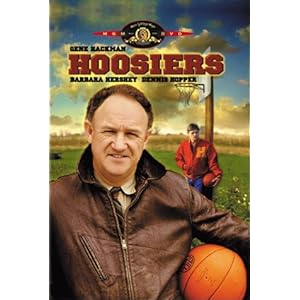
Hoosiers is as predictable an underdog sports story as you're ever likely to encounter. Gene Hackman comes to a small Indiana town to become the high school basketball coach, and he struggles to gain the acceptance of the locals before molding the team into an unlikely winner, more successful than they've ever been before. Dennis Hopper plays the father of one of the players, a drunk and embarrassment to the town who actually knows a lot about the sport. Barbara Hershey is a teacher at the school who questions Hackman's methods but eventually warms up to him. There's a kid who's supremely talented but unwilling to play, and a bunch of ignoramuses who have it out for the interloper. Though it's nothing you haven't seen a bunch of times, Hoosiers is still a charming and well-executed version of that formula. The acting is solid, and the basketball scenes are authentic and exciting. It was a bit weird for the only black people in the movie to appear at the end as players for the big bad final opponent (the movie takes place in the 50s), but otherwise there's not much to really hold against the movie. Pretty likable stuff.
The Russians Are Coming, the Russians Are Coming
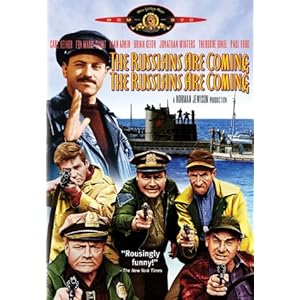
A weird mix of comedy and politics, The Russians Are Coming tells the story of a Soviet submarine crew that accidentally runs aground on an American island and attempts to get back in the water without causing an international incident. Unfortunately, they run into difficulties, and things are exacerbated by the locals who are alarmist about the threat and quick to gossip. Things almost totally boil over in a remarkably tension-filled stand-off before the film remembers it's a comedy and deflates it in a pretty cheesy, feel-good way. It's a likable movie, with some frustrating side characters and maybe too long a running time but not much else to complain about. The best part is probably Alan Arkin's lead performance as one of the Russian crew members, who doesn't actually get a ton of dialogue but when he does always manages to make a lot out of very little. I'm honestly not totally sure what it was trying to accomplish, but it's a pretty good movie.
Tom Jones
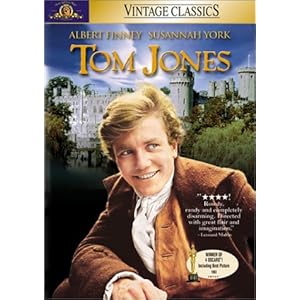
There's something about 18th century England that is just inherently interesting to me. The British accents, the horrible class inequality, the technology still stuck in the beginnings of the Industrial Revolution, it's just... I don't know. Interesting. Tom Jones is based on a serialized novel published during that period, and features Albert Finney playing a bastard who's been raised in kind society and grown up to be a womanizer, well-liked by many but hated by some. The movie actually won Best Picture, which seems kind of strange, but I guess movies could do that back then without being dramas about serious issues or mediocre. Wow that was pretty harsh, I've actually really liked most of the recent winners of that award. Oh well, whatever. Tom Jones is funny, has an intriguing little plot about the secrets people sometimes keep, and has some nice performances. It also frequently features characters talking to or just looking at the camera, which somehow never gets old. And now that the movie has expired from Netflix streaming, the site doesn't have it at all. What's up with that, Netflix?
Saturday, December 3, 2011
Movie Update 31
Friday, August 26, 2011
Movie Update 14
I really liked all of these except for one. See if you can guess without reading the capsules!
All the President's Men
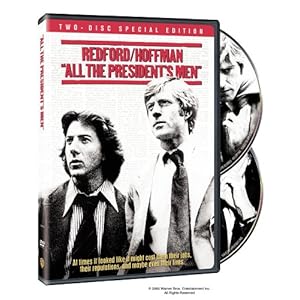
Robert Redford and Dustin Hoffman star as the two Washington Post reporters who broke the Watergate story. The film was only released a couple years after Nixon resigned, and it's fascinating to see a film linked so closely to a historical event. Parts of it would be unbelievable if it wasn't a true story, and it sheds a light on just how crazy the scandal was. The two leads are great, their boss also does a fine job, and it's just an extremely well-put together film. My only real disappointment is that they don't cover as much of the timeline as I would have liked, but at some point they just ran out of time. It's still over two hours.
Bonnie and Clyde

I have to think this is one of the most important films in cinema history when it comes to the depiction of violence. It's quite a bloody movie, and though The Wild Bunch holds the title as the king of violent mainstream 60s movies, it didn't come out until two years later. Bonnie and Clyde is also just a good movie, turning another true story into an interesting plot and resting on great performances by a young Faye Dunaway and Warren Beatty. Gene Hackman also has a nice little role as Clyde's older brother. There were a few spots that felt a bit aimless, but the film lays a blueprint for movies about heists and criminals that would be copied for decades.
In the Heat of the Night

This movie actually beat Bonnie and Clyde for Best Picture at the Oscars, and it was an odd coincidence that I saw them on the same day. Night is also an important film, mostly for its depiction of racism. Sidney Poitier is a Philadelphian homicide detective who gets pulled into a murder investigation in a sleepy southern town after being essentially arrested for the crime of being black. He butts heads with the chief, played by Rod Steiger, who won Best Actor. They eventually try to put their differences aside in order to solve the crime. Night is notable for having real things to say about race while still managing to just be a really good crime movie. Some of the scenes involving race almost border on parody now, but things are still bad enough now in some cases that I guess it's mostly believable for an uneducated, isolated town over forty years ago. Another well acted, solid film.
Intolerance

I usually manage to find something good in these old movies even if the general act of watching them isn't particularly pleasant, but if there's one area where I sometimes struggle with that, it's silent dramas. I didn't like D.W. Griffith's Way Down East, and if anything his earlier Intolerance is even more of a struggle. It's over three hours long, and doesn't really have what I'd call a plot. It has four story threads from four different periods in history, showing the bad things that happen when people can't get along. It's sort of a response to how people reacted to Birth of a Nation (which I still have to see), and feels more like a very long history lesson acted out by mimes than a movie. I can understand how it was significant at the time, and how huge of a production it was. But I just didn't really like watching it at all.
Wednesday, July 20, 2011
Movie Update 11A
Life goes on, and I continue to watch a number of films that I have never seen before. I'm running out of "classics" in the instant queue at this point, and I don't know if I'm going to keep that when Netflix switches up the plans in a couple months. But I'll keep watching movies. 11B goes up tomorrow.
The Conversation

Sandwiched between the first two parts of The Godfather, Francis Ford Coppola made this film, a much more intimate and inward-looking affair. Gene Hackman does a great job (I find it amazing he was already 44 when this was made, but I hadn't realized he retired years ago either) as a surveillance expert who becomes worried by the content of a conversation he is hired to record, and reluctant to hand it over to his client. He's surrounded by a great cast, notably a young Harrison Ford as his main contact with the client, John Cazale as his spurned partner, and a brief appearance by Robert Duvall. It's mostly a character piece, and the script and Hackman's work do a great job of bringing a quiet by interesting man to life. Things do get hairier later on, with some surprisingly shocking moments as it reaches the climax. Nice anti-Hollywood ending, too.
The Hustler
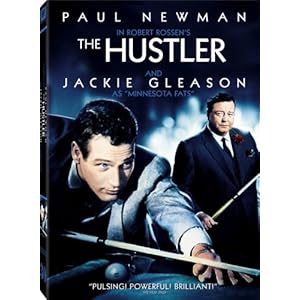
I feel like Paul Newman was sort of a singular talent that came into his own in the 60s, and since he didn't have any direct competitor like Robert De Niro versus Al Pacino, some people my age overlook how amazing of an actor he is. There's no ongoing debate around him, he's just an amazing actor. Could be making crap up, though. In The Hustler he plays a pool shark, and while there are extensive pool scenes in the movie, it's more about the turmoil of the character, who realizes he's not who he thought he was after a game against Jackie Gleason's Minnesota Fats goes bad. George C. Scott is also great in the movie, and it's just a fun film to watch despite some pretty dark material towards the end. The good kind of sports movie that's not really about sports.
MASH

All I really knew about Robert Altman before seeing this was he made movies with ensemble casts that talked over each other, and that's certainly the case here. It's a Korean war movie that's really about the Vietnam war, and showcases funny actors rather than comedians trying to act. The three main characters are military doctors played by Donald Sutherland, Elliot Gould, and Tom Skerritt who don't care much for proper chain of command or behavior for their positions. It's not really realistic how cavalier they are with their mistreatment of other officers in the movie, but it's a satire, and it works. I didn't think it was an amazing movie, but I did enjoy watching it go through its paces, and there are a number of memorable scenes, even if some don't quite pay off or go on too long. I can definitely see how some producers looked at it and saw a way to make a series out of it, after removing some of the racier stuff. I assume I'll continue to never see it, but you never know.
Play Time

One of those movies that I didn't really love, but I appreciated the immense amount of care and craft behind. It's hard to say what Jacques Tati's deal is, beyond a lot of wide shots filled to the brim with little bits of physical comedy in every corner of the screen. Play Time is a film where dialogue isn't very important, and I could easily see the whole thing working almost as well with no subtitles at all (it's already a mix of French and English), or even as a silent film. It's about a tragic future version of Paris, where all of the famous landmarks people love have been replaced with plain buildings filled with sterile cubic offices, steel floors and chairs with squishy cushions. Humanity still shines through though, as Monsieur Hulot and an American tourist bumble around the trade shows and turn a disastrous restaurant opening into a heck of a party. I think the whole thing could have greatly benefited from chopping as much as half an hour off, but there's nothing wrong with any individual scenes. You can just only take so much whimsy and clever visual comedy before it all seems like the same stuff. Still a solid film.
Friday, December 10, 2010
The French Connection

The French Connection is sort of in a weird position with regard to its legacy and how well it holds up. On one hand, it fits right in with a lot of more modern thrillers and crime stories, because it was a really early example of the super gritty way of doing that, with a down to earth and believable style and blunt depictions of its adult content. But on the other hand, some of the impact of that is lost because it's become such an obvious way to do these kinds of stories. The shock of seeing movies made this way is lost when it's so common now. A victim of its own influence. It's still a very good movie, but it was probably amazing 40 years ago. Back then it was showing a dark side of New York no one had ever seen before, but now it looks completely familiar to anyone who's ever played Grand Theft Auto IV. Today I wouldn't pick it as a better film from that year than A Clockwork Orange, but I can see how it was definitely more important.
The film is based on the true story of two narcotics cops in New York uncovering a heroin pipeline from France to their own city, slowly over the course of a few months, as they follow suspicious characters, listen to hours of taped conversations, and gradually connect the dots in a large criminal conspiracy. It's basically like a mini-season of The Wire, and as a bonus it's all basically real. Gene Hackman and Roy Scheider are essentially playing real people, only slightly fictionalized versions of the real cops, and they both happen to be outstanding in the movie. Hackman won an Oscar playing Popeye Doyle, and it's here that he created his tough-guy persona that he's used on occasion to great effect for years. A lot of the movie is fairly sedate, but things always have a chance to get dangerous when Doyle's around, and the film does happen to have a pretty outstanding action scene added near the end. It only exists because a producer mandated that they add a chase that outdoes Bullitt, but it's a unique and exciting scene that doesn't match the technical superiority of more modern chases but in some ways manages to thrill more, and it's just a great sequence from start to finish. The ending is surprising in its ambiguity and lack of triumph, but it definitely works for the story they were telling. It's a movie about the real world, and from that perspective it seems like a total success.
Thursday, August 27, 2009
Unforgiven

Let me just take a moment to acknowledge David Peoples, a screenwriter who without me realizing it until now has written screenplays for three movies I've liked and blogged about in the last year and a half; this, 12 Monkeys, and Blade Runner. That's a pretty diverse and impressive list. Good on you, Peoples.
Anyway, Unforgiven is probably the best western I've ever seen. It's not the normal easy moral tale where some kindhearted gunslinger saves the township from evil bandits. There's no good guys or bad guys in this movie, just people on opposite sides of things. Clint Eastwood directed and stars as a former tough son of a bitch who got domesticated by his now-dead wife, but has to return to killing for the money. Morgan Freeman is his old partner who agrees to come along. Gene Hackman won an Oscar for his performance as the sheriff of the town the story revolves around, and he's equal parts dedicated lawman and vicious bastard. Richard Harris shows up as a dishonest gunman known as English Bob, and he's mostly there to give Hackman something to do while Eastwood and his posse take their good damn time getting to the plot. The movie seemed a bit slow in places, but I find that to be a common malady of the western genre, and the movie is well-written and well-put together enough to keep it from ever getting too dull.
Basically, some whores put together some money for a bounty on a couple cowboys outside Hackman's law, and Eastwood makes the long journey to try and collect. Obviously they end up at odds, and despite it not being the reason for the journey, the resolution of their conflict is the story's climax. It's an interesting, dark movie, one that shows the supposed violence of the time without ever once glorifying it. It's heavy without being heavy handed, and both manages to convey a message and simply deliver a clever, violent western if that's all you're looking for. I found it to be well deserving of its many awards, and got me interested in some other work by Eastwood.

































